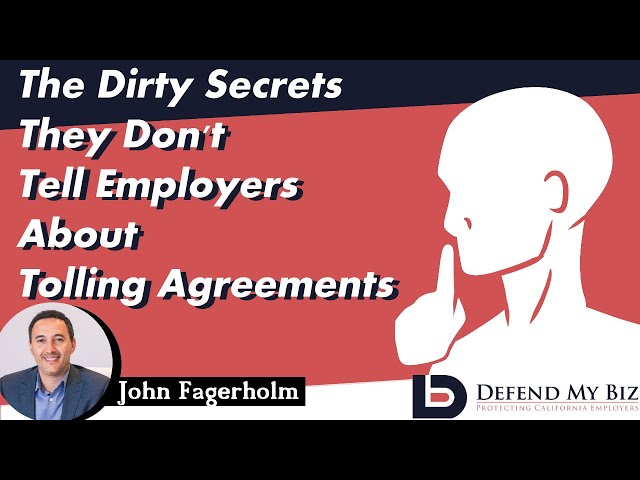
Posted on June 23rd, 2020
Find below a complete transcript of this video.
What’s up fellow entrepreneurs today I want to talk about tolling agreements. It’s not a big subject. It’s not something that I get asked about a lot, but it’s just come up a few times in the last week.
So I thought I would mention it because each time I had to explain to my client why they should do it or shouldn’t do it. And it is subjective and based on strategy.
First let me tell you what a tolling agreement is. Typically when a plaintiff-side attorney sends you demand letters that have suing you, what they’ll do is they’ll add a tolling agreement and they’ll say something like, here’s everything we think you did wrong.
Here’s all the records that we want and here’s a tolling agreement attached. Sign the tolling agreement and send it back to us. Or we’re going to file a lawsuit automatically.
Some attorneys do, some attorneys don’t. But what a tolling agreement is, is that it tolls the statute of limitations.
So every labor claim well, every claim typically accept some things in criminal law have statute of limitations, which means that the claim has to be filed within a certain amount of time with, with most things in labor related.
It’s a law. It’s a three years. So basically within three years of the harm happening the plaintiff would have to file suit and each day that goes by, that eats up into the statute of limitations.
Attorneys that prefer to mediate prior to filing a lawsuit will want you to sign this tolling agreement so that, so that they don’t have to file the lawsuit and they don’t lose you know, any time on the statute of limitations.
Sometimes I just say no to the tolling agreement. I say, you know what, if you’re going to file it, file it. And that’s because, I look at the case and I don’t think that mediation is going to help anyway.
You know, who cares. But sometimes if I think it’s a case that, you know, that could sell a mediation, either my client has a lot of liability or I know the attorney on the other side or whatever the reasoning is, then I may say, okay, well sign it because a lot less expensive to get rid of this in mediation than it is to respond to a lawsuit.
Start going through that process and then end up in mediation you know, six months later. Anyway. So basically what it does is save the client attorney’s fees, even though the drawback to that is that if a lawsuit is filed any way, then it’s told it doesn’t matter how much time it took it, it’s, it’s the statute of limitations hasn’t run because of the tolling agreement.
So anyway, those are kind of or that’s sort of the thought process of I have of whether I tell my client we should sign a tolling agreement or we shouldn’t.
And it’s just, it’s, it’s all over the place. But hopefully, at least you kind of understand what a tolling in the agreement is at this point, because that seems to be the document that freaks people out.
You know, the demand letter does too, but the tolling agreement seems to be the one that they say, well, I’m not signing anything no matter what. And then it just depends again.
All right, fellow entrepreneurs until next time, be productive.


